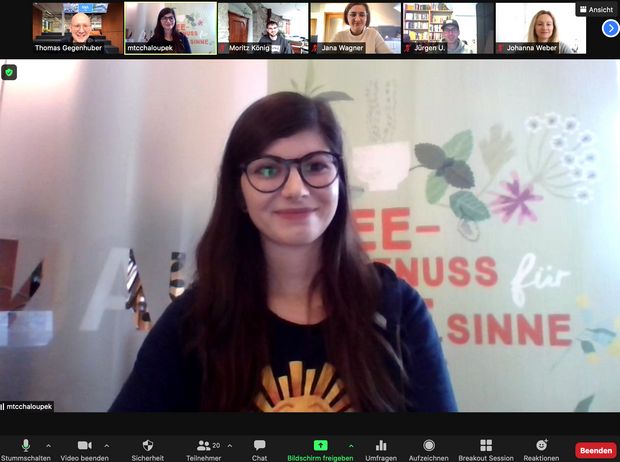Sustainable Transformation Dialogues: Marie-Theres Chaloupek on the interplay between ecology, economy, and social commitment.
Marie-Theres Chaloupek, press spokesperson at Sonnentor, was a guest at the Sustainable Transformation Dialogues on November 24, 2021. The central question in this session was how companies can unite both economic and ecological-social goals. The event - currently online via Zoom - takes place as part of the Socio-Technical Transition Management course taught by Prof. Thomas Gegenhuber in the Bachelor of Business Administration, Major Sustainability Management.

The Waldviertel-based company Sonnentor, with its headquarters in Sprögnitz, produces a wide variety of teas, herbs, and spices. The raw materials come from about 1000 organic farmers worldwide. Increasing the common good plays an important role in the company, according to Chaloupek. The focus is on people, nature, the environment, and society.
Chaloupek emphasized that the common good, sustainability, and economic success do not contradict each other, which is also reflected in the company's motto: "Green figures instead of writing black figures". In this context, the common good economy offers key figures that make sustainable management as well as the social commitment of a company measurable. Discussing this with the students, Marie-Theres highlighted the role of the Common Good Report, which Sonnentor publishes every two years. It is important to make sustainability visible and measurable, says Chaloupek, to increase transparency and thus credibility. In this way, Sonnentor also wants to distinguish itself from other companies where corresponding CSR activities serve the so-called "greenwashing".
What does the company do to operate sustainably? The basis of Sonnentor's business is the circular economy. Wherever possible, cycles are closed to save resources. For example, herb waste is pressed into pellets and used for heating, herb stalks are used as mulch at the company's own organic farm Frei-Hof, and leftover cardboard boxes are shredded and reused as packaging material. A third of the electricity is generated directly by the company's own photovoltaic system on the production hall. The packaging of the products is recyclable and compostable. Furthermore, product packaging has been rethought and optimized to the extent that this has saved transport costs and also minimized CO2 emissions. Of course, investments are necessary for these practices, but they pay off in the long run: less resource consumption means lower costs - a win-win situation.
Prof. Thomas Gegenhuber thanks Marie-Theres Chaloupek for the informative lecture: "It is important to give students insights into companies. Marie-Theres Chaloupek's lecture helped the students to understand what challenges exist when a company wants to bring sustainability in line with economic goals."
